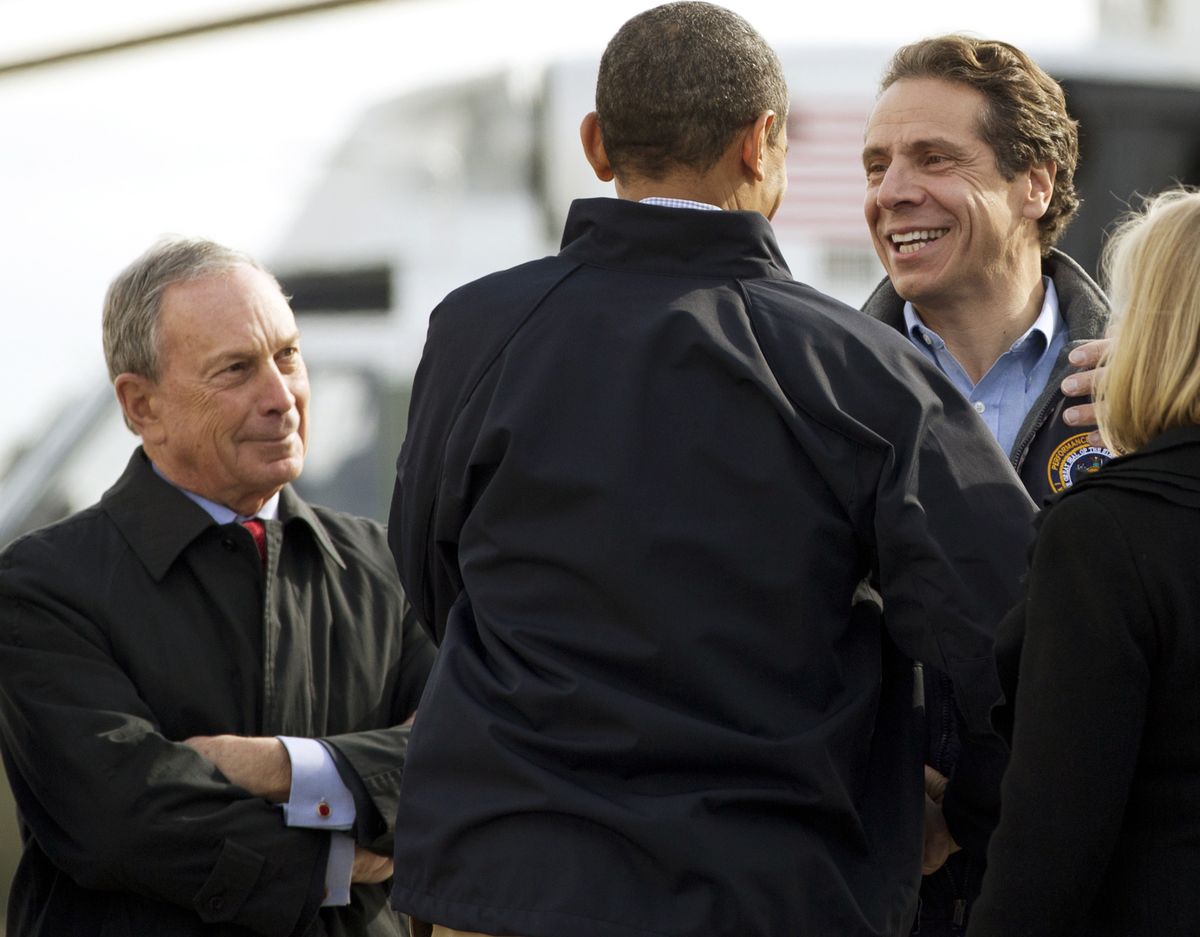Sandy a test of leadership
Governors, mayor praised for quick, decisive action

NEW YORK – For New Jersey Gov. Chris Christie, leadership often came with an empathetic hug. For New York Gov. Andrew Cuomo, it came with an angry tirade at utilities slow to restore power. For New York City Mayor Michael Bloomberg, it came with businesslike assurance.
Experts in leadership and disaster response interviewed by the Associated Press gave all three chief executives high marks for their performance so far in Superstorm Sandy, a disaster that left more than 100 people dead and presented perhaps the biggest crisis-management test yet for three Northeastern politicians who have all been rumored to hold presidential ambitions.
“Throughout the country, what the American people seek is a kind of authenticity in their public leaders, and these three guys have demonstrated that authenticity throughout this crisis,” said Syracuse University political science professor Robert McClure.
Most of those interviewed said Christie stood out for being the most outspoken and ahead of the curve, whether ordering gas rationing nearly a week before anyone else, putting his GOP credentials on the line to praise the Obama administration’s response or using a televised briefing to comfort children with a simple: “Don’t be scared.”
All three men took firm command before Sandy arrived. Cuomo closed New York City’s subways and tunnels hours before there was a threat of flooding and strategically “pre-positioned resources” days before, a move the federal transportation secretary later praised. Christie struck a get-tough note in ordering people to clear out along the coast, barking, “Don’t be stupid” on Twitter. Bloomberg calmly ordered an evacuation of the city’s low-lying areas.
Not everything went perfectly. Many of Sandy’s victims complained that power outages went on for too long, that gas station lines were infuriating, and that temporary housing against November’s cold seemed to be an afterthought.
At times, the crisis threw all three men off balance: Bloomberg reversed himself in the face of a huge backlash and canceled the New York City Marathon, Christie picked a fight with the Atlantic City mayor for sending people to city shelters instead of evacuating them, and Cuomo’s attacks on utilities thudded when he took on the Long Island Power Authority, a state utility over which he has some control.
Christie provided the defining moment for a country torn by gridlock and partisanship, boarding a helicopter with President Barack Obama for a tour of the battered Jersey shore. On the first full day after Sandy, six days before the presidential election, the Republican talked up Obama like a bowling buddy.
When some conservatives branded him a traitor to the GOP, Christie took a politics-be-damned stance: “They haven’t been to New Jersey. Come see the destruction. Come see the loss.”
In the storm’s aftermath, Christie had reassuring words for New Jersey children, saying they should “let the adults in your community take care of you. We’ll be there for you.”
Cuomo, meanwhile, directed troops, stood in the driving rain just outside the Brooklyn-Battery Tunnel to see the whitecaps inside, held daily TV briefings and took NBC’s Brian Williams into a flooded commuter train station. The images helped support his request for $30 billion in federal aid.
McClure said Cuomo and Christie learned from the bungles of storms past and put material and staff in place days before Sandy began lashing the coast. “These guys took a huge risk at some level because once you start doing all this stuff early – and nothing happens – it’s expensive,” he said. “These guys are smart.”
As for Bloomberg, “He is not a leader, he does not inspire and he does not consult. He doesn’t feel your pain and apparently he doesn’t want to,” said Doug Muzzio, political science professor at New York City’s Baruch College. “But on a CEO level, at the moment, I think he did a good job. … It seems they did all that was reasonable to do and more prior to the storm and during it.”